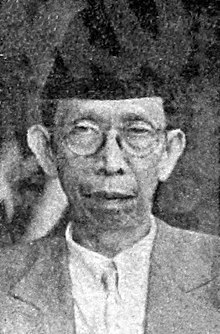Ki Hajar Dewantoro
| Ki Hajar Dewantara | |
|---|---|

Ki Hajar Dewantara in 1949
|
|
| 1st Minister of National Education of the Republic of Indonesia | |
|
In office September 2, 1945 – November 14, 1945 |
|
| President | Soekarno |
| Preceded by | Office created |
| Succeeded by | Todung Sutan Gunung Mulia |
| Personal details | |
| Born |
Raden Mas Soewardi Soeryaningrat May 2, 1889 |
| Died | April 26, 1959 (aged 69) |
Raden Mas Soewardi Soerjaningrat (EYD: Suwardi Suryaningrat); from 1922 also known as Ki Hadjar Dewantara (EYD: Ki Hajar Dewantara), which is also written as Ki Hajar Dewantoro to reflect its Javanese sounds; May 2, 1889 in Yogyakarta – April 26, 1959 in Yogyakarta, was a leading Indonesian independence movement activist, writer, columnist, politician, and pioneer of education for native Indonesians in Dutch colonial times. He founded the Taman Siswa school, an institution that provides educations for indigenous commoners, which otherwise was limited to the Javanese and the Dutch colonials.
He was honored as a National Hero of Indonesia by Indonesia's first president, Sukarno, on 28 November 1959.
Soewardi was born in a Javanese aristocracy, his family ranked to the royal house of Yogyakarta. Thanks to his family's priyayi (Javanese nobility) background, he was able to access the colonial public education, a luxury that was unattainable by most of common population in the Indies. He graduated from basic education in ELS (Dutch Primary School). Then he continued his study to STOVIA, a medical school for native students. However, he failed to graduate because suffered an illness. Later he worked as a journalist and wrote for numbers of newspapers, among others are, Sediotomo, Midden Java, De Expres, Oetoesan Indies, Kaoem Moeda, Tjahaja Timoer and Poesara. During his career in printed media, he was considered a talented and accomplished writer. His style of writing is popular, communicative and yet imbued with freedom idealism and anti-colonialism sentiments.
...
Wikipedia
